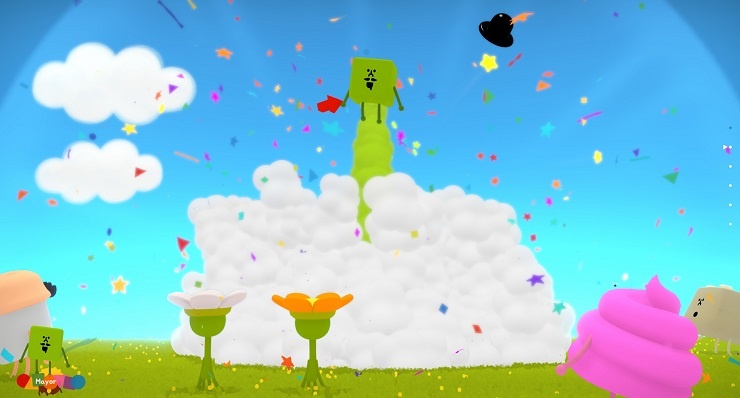Wattam and The Last of Us II both see us facing existence after an apocalyptic event, but I’d choose the former’s hope over the latter’s despair any day.
SPOILER WARNING FOR WATTAM AND THE LAST OF US II
A man in a hat smirks at the crowd. He reveals an explosive, detonating it within the throng. They giggle as they fly in the air. Wattam is delightful. However, I can’t help but contrast it with another game I’ve been playing with my wife where you can fire off explosives, but to much more gruesome effect: The Last of Us II. The former has us blowing cheerful folks up to send them flying through the air, colorful rainbow clouds billowing out behind them as they laugh. The latter leaves folks screaming out for their dead loved ones, blood and body parts scattered across the billowing grass.
Where the two diverge (well, besides just about every single aspect of their design, play, sound, and visual style) is in the emotions they’re striving to touch upon. One is about joy and togetherness when people find themselves in troubled times. The other is about a humanity wallowing in misery – a bottomless pit of self-feeding despair – when met with adversity. Both games love to blow people up, but are reaching for very different feelings when they do it. Both games have seen their worlds face an apocalypse, but have taken very different tones on what that should mean for those holding on to life afterwards.
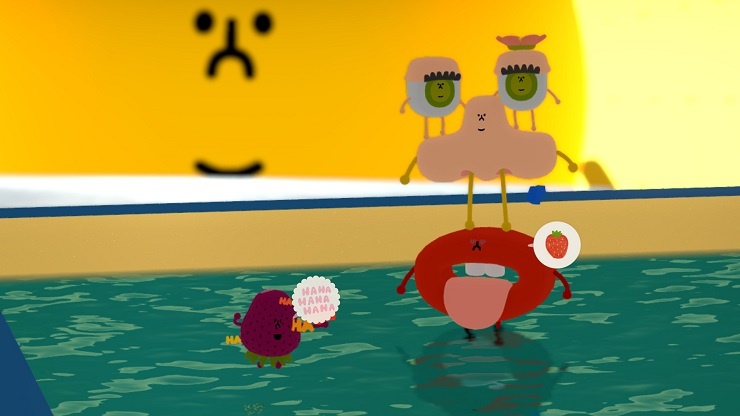
Wattam is a game where you meet people struggling to solve their problems in their own way. These people just happen to be phones who are missing their receivers (seemingly constantly), beaches that need some water, or rocks that just want to meet new pals. Many of their problems can be solved by holding hands, providing emotional support in hard times, and working together to overcome troubles. And a cheerful explosion here and there.
You meet dozens of colorful beings throughout your time playing the game. Each stands out in their design, presenting unique beings that can all interact with the world and other characters in their own way. Many of them don’t even speak the same language, but through gestures and imagery, you’ll be able to understand them. You’ll learn about their needs as you play, steadily helping these goofy people find what they need. Or maybe you;ll all just hang out and play, as that’s equally viable. You’re free to simply interact between them, seeing the fun, happy things these goofy beings can do together.
These smiling folks just need to rely on each other, sharing in their skills and abilities, to solve every problem there is. Including the problem of being turned into adorable poo by a living mouth.
In The Last of Us II, the world has been overtaken by a plague that turns people into violent mushrooms (I’m maybe oversimplifying a bit), leaving society in shambles. This cruel world quickly shows that we can best solve our issues with others by driving a golf club into their skull. It shows that people can come together, but that they’ll selfishly chase revenge even if it burns every bit of their happiness to cinders. That they’ll break themselves, kill people by the dozens, destroy cities, enslave people, torture, and deliver foes into terrifying fates if it means sating their anger for even a moment. People are a thing to be overcome and ground underfoot in this world, with every act giving way to further and further misery and violence. There are moments of togetherness to be found, but they all get left behind to chase an empty revenge against the cruelties of existence.
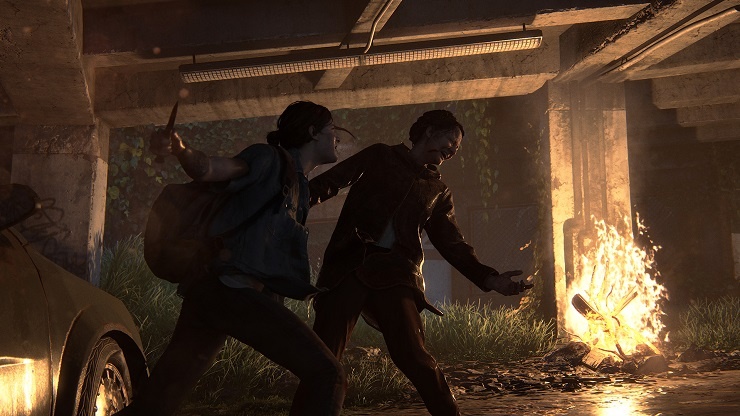
They are a strange pair of games to play back to back, with Wattam being so focused on showing the possibilities of hope and togetherness while The Last of Us II seeming hell-bent on showing humanity at its darkest, continually plumbing further depths of human misery. One shows us the best of what we can be, while the other assumes we’re all snarling animals just waiting for a veneer of civility to fall apart. One shows that we come together when times are tough, the other that we’re just waiting for a reason to turn on one another.
The Last of Us II is the last thing I need right now – the furthest thing from the reality I’m witnessing as people strive to help one another in a pandemic. When thousands march in the streets to show support for Black Lives Matter movements against police brutality. When thousands of dollars are raised to help protestors in Hong Kong and to assist trans youth at risk. It’s in Wattam, where we join hands and try to build each other up, that I find the hope that’s struggling out there in this ruthless world we all share.
In an existence where pain and suffering creep endlessly towards us – where loneliness and depression aim to break us – Wattam tells us that we can all work together. That we’re all deserving of joy and understanding. That the things that divide us are distractions from the fact that we are all beings worthy of love and friendship and delight if we strive to share that with others. If we work to lighten the loads of our fellow people, we will find our own existence enriched with hope and joy. It will be a struggle, but we can reach that place in spite of the suffering and troubles placed before us.
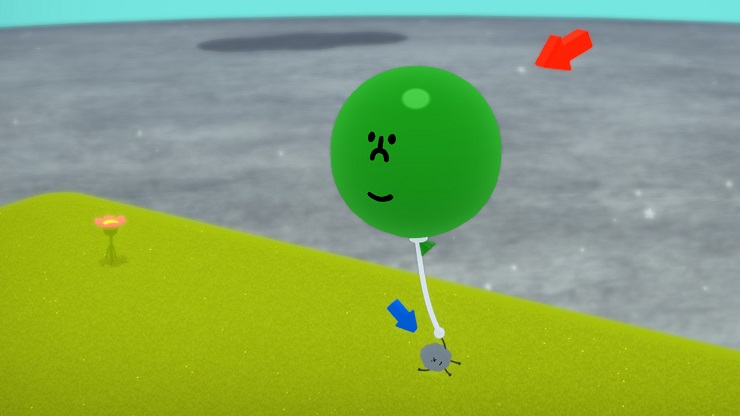
We can grow seeds into giant trees to sustain us, if we work together. We can understand one another in the chaotic joy of flying through the air, carried on a cartoonish explosion. We can help balloons overcome their fear of heights. Help rocks find friendship. Savor the scent of something wonderful along our path. Yes, it’s all cartoonish and silly, but seemingly ‘silly’ or ‘childish’ things can be the sort of stuff that’s born of a time before we became jaded and miserable. In these silly moments, it shows that we can choose happiness and togetherness rather than let our problems bury us in selfishness and loathing of our fellow beings and the ‘inconvenience’ their pain causes you.
The Last of Us II doesn’t see the world that way, though, consuming its characters in murder and mayhem in pursuit of their own desires. We see them completely consumed by their selfish desires, dragging main character Ellie down again and again despite the loss of more and more friends and loved ones. We see her left with nothing at the end of it all – a hollow shell that has discarded everything to quench a bottomless thirst for revenge. We see Abby, the game’s ‘villain’ of sorts, finding some sort of meaning after giving up her own vengeance, only to be caught up by another group’s boundless cruelty.
Every moment of the game is spent in this misery. Every human faction is trying to kill or enslave another group. Every face promises more cruelty for the player characters. The game even begins with a terrible betrayal, having you play as Abby during an early chapter, having her meet up with Joel, one of the main characters from the original game, only to kill him in front of Ellie. You start off being tricked into causing Joel’s demise. You’re made complicit in the death of a beloved (depending on how you feel about him) character. Or at least one that Ellie cares about a great deal. You did this.
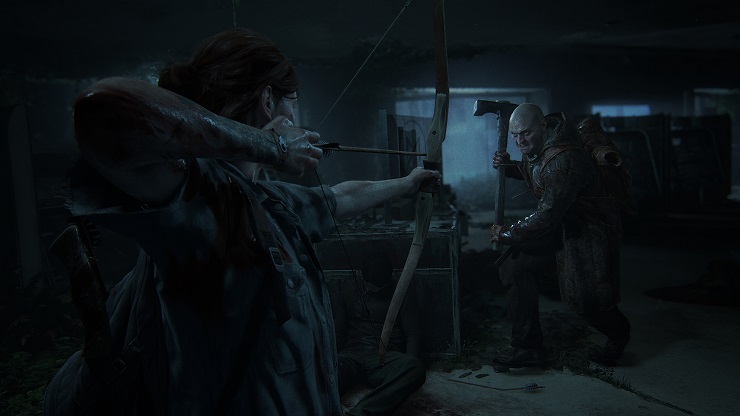
There is no hope from here that I could feel. Ellie kills everyone she can on her path to avenge her loss. Even if the player tries to use stealth to avoid it, the game forces violence on the player anyway. You aren’t allowed to be passive throughout this adventure. You’ll be forced to take part in this awfulness no matter what you want, making it clear that this world won’t brook you having a kind heart. It will break you down eventually, because there is no hope here.
Even Abby, who arguably turns her life around despite heavy loss, finds herself captured and enslaved by another human faction while trying to find some allies. If you’re good, you simply exist to be taken advantage of in the world of The Last of Us II.
It languishes in pain, presenting an unscalable wall of despair. It never lets up that humanity is a cruel, vicious, heartless thing, and that all you can do is take as much as you can. It was an ordeal to get through – a physically taxing thing that seems to only exist to be endured, rather than played. It is a testament to misery – an idol to suffering (given the cruel, relentless working conditions of the staff that made it, maybe this is eerily apt).
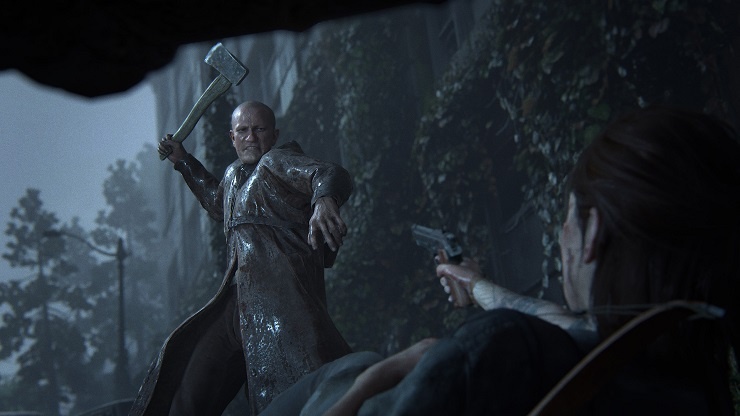
Wattam is a helping hand that wants to lift us up. It’s a game about the childish happiness found in causing innocent mayhem. It’s the playful side of games that sees us playing at violence, but drawing friendships from it. We’re sparring – acting out pretend against one another, but bonding over this playful competition.
Each person we meet isn’t cause for alarm, but carries the exciting potential of new friendships and activities. Even if we don’t understand them due to language barriers, or they have desires different from our own, we can respect each other and find happiness with one another in working together. We understand the smiles. We understand the laughter. And that is enough to love one another, here.
I am sure I will be accused of being naive about the human race, and maybe I used to feel that way, too, but I see hope in our futures when I look out into the world. I see so many working to build each other up and make the world safer and more loving for one another. I see so much caring crossing barriers worldwide as we strive to become a global people, aiming to help one another with suffering no matter where we are. I see the colorful world that Wattam imagines in the actions of so many people. I see that same play and togetherness – those friendships that just wait for us to say hello to a stranger.
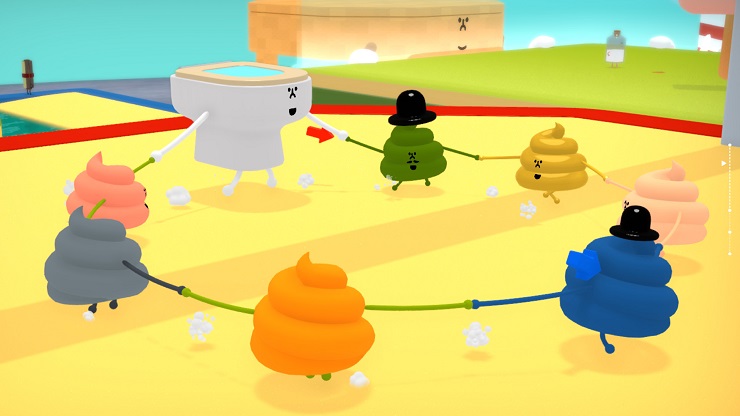
I don’t need games like The Last of Us II telling me that we are destined for misery. As we look to the people trying to help, we can see the falsehood in these supposed ‘realistic’ fictions where everyone is out to destroy one another, just needing an excuse to do it. I don’t need to endure this stuff when I see the world of Wattam taking shape as complete strangers face terrifying odds and the agents of greed in the streets together.
Wattam, with its ridiculous play and goofy, fun explosions, presents a heartwarming world where we all can love one another – where we all value each other and treat our problems as those of the community. Where our problems can be overcome with that same love we feel for our fellow living beings. That is the place I aspire to see in the world, and it is a deeply healing game in a time when darkness is trying to drag us down and make us believe that’s all there is.
But it’s not. And some day, our love will shout out that darkness.
And then we’ll become living nose people? That like to blow up? Sure, why not?
Wattam is available now on thePS4, Epic Games Store, and Steam.

